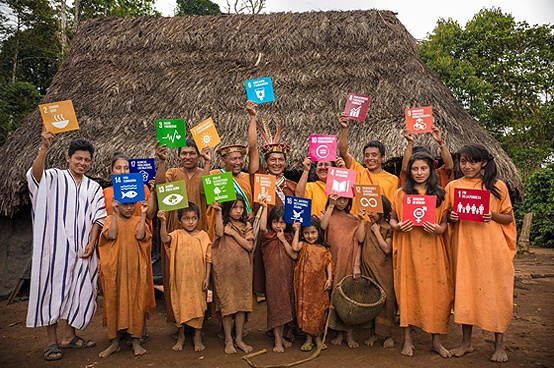Management and Governance of the Coalition

The UNDP and UNICEF co-lead the SDG Synthesis Coalition and the Secretariat is based at UNDP’s Independent Evaluation Office.
A Steering Committee of high-level political representatives sits at the top of the Coalition’s governance structure. It serves the activities of the Coalition by identifying key learning needs for the achievement of the SDGs, to secure broad participation and ownership, and to ensure the communication and uptake of findings lessons.
Each synthesis pillar is co-led by different partners and supported by a Management Group, who lead on setting the scope and terms of reference, engage strategic partners, support resource mobilization, ensure timely delivery of the synthesis, and support communication and uptake.
- The Partnership Pillar is co-led by UNDP and Canada
- The People Pillar is co-led by UNICEF, UN Women, WFP, UNESCO and UNDP
- The Planet Pillar is co-led by UNEP and GCF
- The Prosperity Pillar is co-led by ILO, UNIDO, CAF, and UNDP
- The Peace Pillar is co-led by OIOS, PBSO, UNDP and UNODC
Each synthesis pillar is also supported by a Technical Advisory Panel, comprised of subject-matter and methods experts nominated by the respective Management Groups. They help quality assure the synthesis products, support the communication of the lessons to relevant stakeholders, and help facilitate uptake at the appropriate levels of decision-making.
What are the key objectives?
This is an ambitious and unprecedented multi-agency initiative that aims to synthesize rigorous and evaluative evidence organized around the five pillars of the Sustainable Development Goals - People, Planet, Prosperity, Peace and Partnership. The objective is to complete all five syntheses in time for the UN Summit of the Future in September 2024. The multi-agency and participatory nature of the Coalition ensures that each synthesis speaks to the key policy and thematic priorities for each SDG pillar.
Each synthesis will incorporate evidence from
- Impact evaluations and systematic reviews that provide findings on the effectiveness of interventions towards the SDGs
- Evaluations undertaken by UN agencies and other bilateral and multilateral institutions that provide findings on how programmes and interventions were implemented
- Voluntary National Reviews, which provide country-level accounts of successes, challenges and lessons learned from implementing the SDGs
- An analysis of progress against SDG indicators to identify positive outliers
The synthesis and triangulation of evidence from these different sources provides an opportunity to provide lessons and findings on:
- What interventions and approaches work for achieving the SDGs
- How and why they work, in which contexts and for whom


